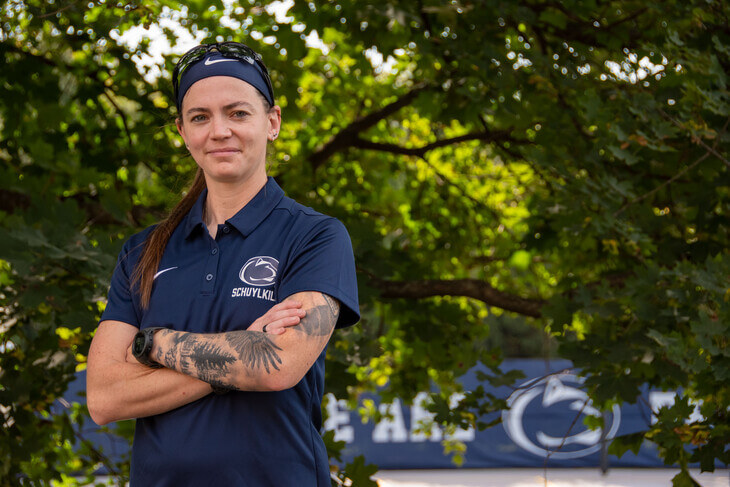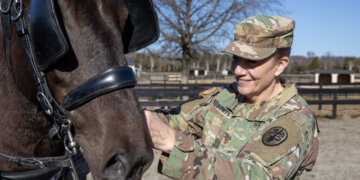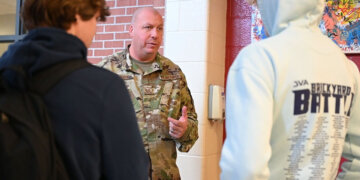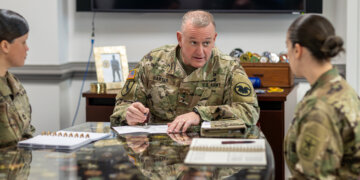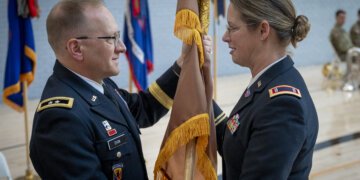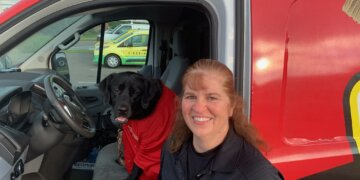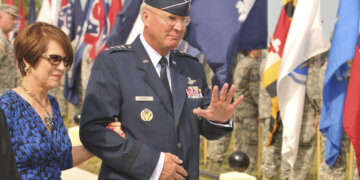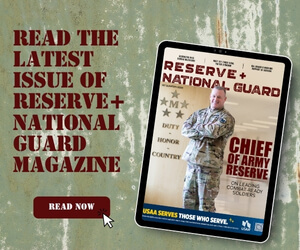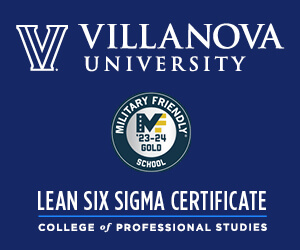Kate Fullerton prefers to stay busy.
In college, she played softball and double majored in psychology and exercise and sports science at Guilford College in Greensboro, North Carolina.
Fullerton currently works as the head athletic trainer at Penn State Schuylkill — the only trainer, in fact, for 11 sports.
She also recently began managing game-day operations when the National Association of Intercollegiate Athletics athletics resumed after pausing amid the COVID-19 pandemic.
If that weren’t enough, Fullerton joined the U.S. Army Reserves in May 2018.
“I like to work, and I love both my jobs, so I don’t get burnt out too quickly,” Fullerton said of how she balances such a full plate. “There’s definitely some long days, but knowing when you need to take that vacation day or sick day and being able to balance that off time with that work that you do is critical.”
Now, Fullerton, a 1st lieutenant and company commander with the 345th Military Police Company, faces a new challenge after her unit was called up for a yearlong mission in Cuba — her first overseas deployment.
“I’m excited,” Fullerton, a New Jersey native, said. “This is why I joined, and I’m grateful to finally be able to be put in a position to do something for our country. Whatever that mission may be, I’m glad to be here and definitely more excited than nervous.”
RELATED: Navy reservist pursues lifelong passion as pro golfer
Fullerton, who earned her master’s degree in athletic training at Bridgewater State University in Massachusetts, joined Penn State Schuylkill in November 2016. She oversees sports medicine, nutrition and strength training for baseball, men’s and women’s basketball, men’s and women’s cross country, coed golf, women’s soccer, softball, volleyball, and men’s and women’s track.
“It’s been a very humbling process, that’s for sure,” Fullerton said. “A lot of things, you need to learn on the fly, kind of jump through some hoops to make sure that you’re in accordance with the state laws, the federal laws, the school and their policies.”
Athletic training primarily involves working with athletes to keep them healthy and performing at the optimum level, but she’s also responsible for equipment maintenance records and other administrative duties.
Camaraderie a requirement as athletic trainer, reservist
The Army Reserves, including completing officer candidate school and the Basic Officer Leader Course, fulfilled a lifelong dream for Fullerton. It also helped her balance the myriad responsibilities of her job at Penn State Schuylkill, especially after she took on game-day operations — getting venues competition-ready, coordinating with opposing schools and ensuring events run like a well-oiled machine.
“One of the things that it teaches you when you go to be an officer in the Army is attention to detail and that command presence,” Fullerton said.
It’s also instilled confidence. When it comes to the medical aspects of her job, Fullerton is comfortable and confident in the expertise she’s gained through school and experience.
Setting up the right number of chairs on the sideline for a basketball game? Or making sure the scoreboard is set up properly, and game officials have the necessary scorecards for a soccer match?
“That’s definitely not my area, but I was able to take charge of that and run those game operations and make sure everything in that entire athletic department ran smoothly to fill in gaps where it was needed,” Fullerton said. “… Being in the Army Reserves has helped me gain that confidence outside of my area of expertise to be able to lead when I need to.”
She sees reciprocal benefits to her two jobs.
“Both athletics and the military require camaraderie,” Fullerton said. “You need to be able to rely on that person next to you. It’s a team sport. It’s a team effort on both fronts of that — in addition to being able to know your body and know your limits and being able to excel and optimize that performance in both areas, whether it’s athletics on the field or in the military to complete your mission.”



